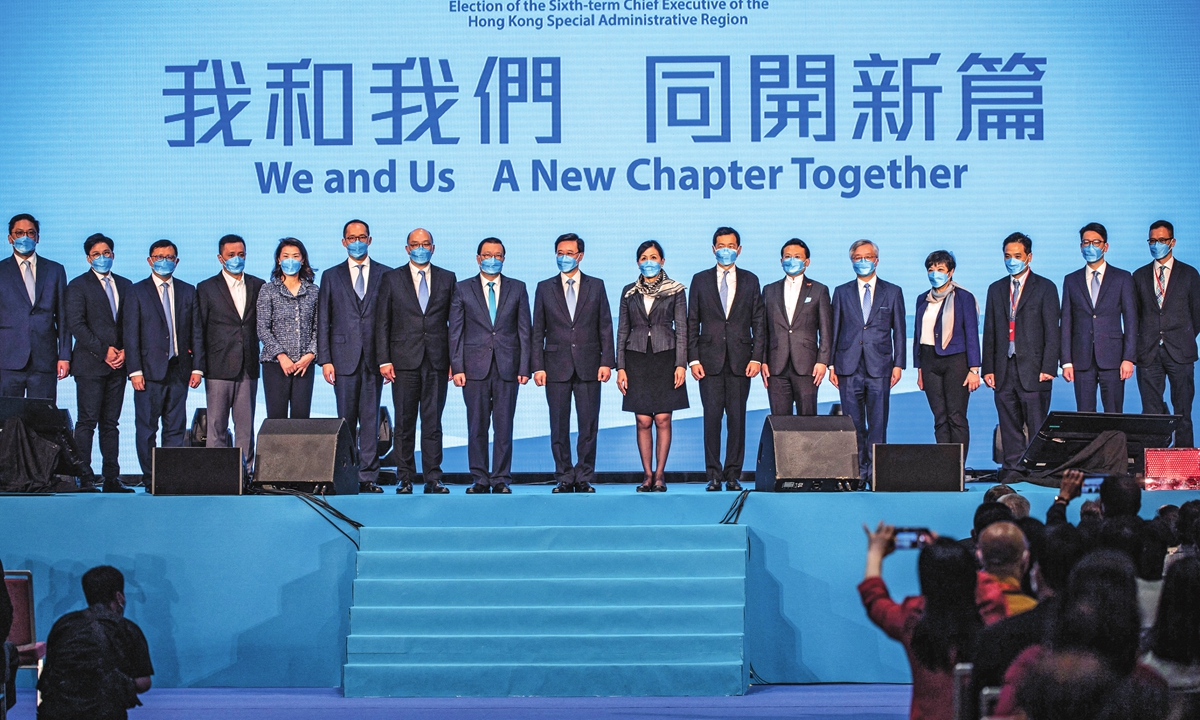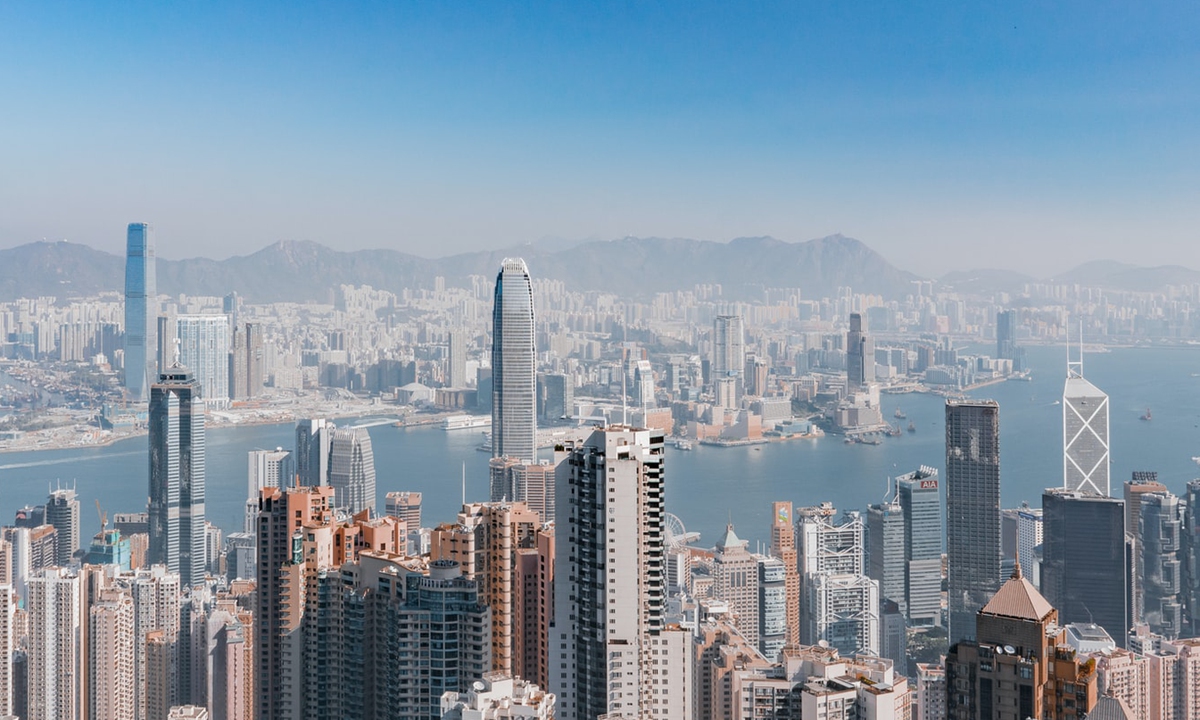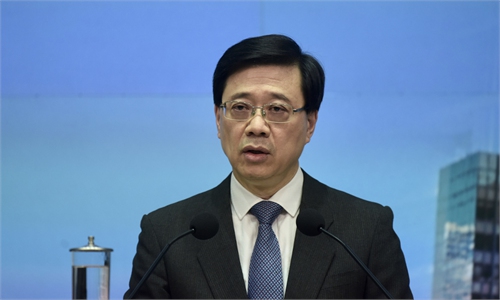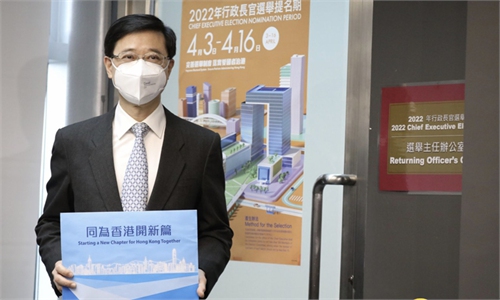HK expects solidarity, effective governance as chief executive election to kick off on Sunday

Candidate John Lee Ka-chiu (center) poses for a photo after speaking at an event in Hong Kong on May 6, 2022, ahead of the Hong Kong Chief Executive election scheduled on May 8. Photo: AFP
In two days, 1,461 Election Committee members in Hong Kong are expected to cast their votes at the Hong Kong Convention and Exhibition Centre in Wan Chai as the sole candidate John Lee Ka-chiu is aiming for the city's top job.
While the upcoming chief executive election has been widely described by Western media and observers as "unusual" and "unprecedented" as some see it as a one-man race, Lee and his team gathered for the final rally on Friday before election day, unleashing a message of confidence and readiness to unveil a new page for the good governance in Hong Kong amid growing challenges.
With the theme of "We and us, a new chapter together," the rally invited about 1,000 people including business tycoon Li Ka-shing and former chief executive Leung Chun-ying.
Lee called on the voters to cast their ballots, saying that "we need to seize the opportunities to forge Hong Kong as an international metropolis." In the next five years, we will make Hong Kong a place of hope, he said.
In backing the sole candidate, former chief executive Leung Chun-ying, who is also vice chairman of the National Committee of the Chinese People's Political Consultative Conference, said that the chief executive is not only accountable to Hong Kong, but also to the central government, stressing that the city has an executive-led government and under the Basic Law, the chief executive can be elected in Hong Kong through consultations or elections, and then appointed by the central government, citing the constitutional basis for the election.
The former chief executive also called on Election Committee members to cast their votes, hoping that under the governance led by the next chief executive, Hong Kong will further help the country open up to the world, further integrate into the country's overall development, and actively participate in the country's overall governance.
Political heavyweights such as Henry Tang Ying-ye, former chief secretary for the administration and a Hong Kong member to Standing Committee of the Chinese People's Political Consultative Conference, and Executive Councilor Ronny Tong Ka-wah, expect Lee will gain most of the votes on Sunday. Considering the policy platform laid out by Lee, Tang hopes Lee could lead an effective management team, making improvements in economy, social, livelihood and overall development.
The election on Sunday is considered the most important one for the political life in Hong Kong. Since the implementation of the electoral reform, which fundamentally changed the rules of the political game in sweeping out the anti-China figures and some backed by Western forces, observers believe that the Hong Kong people can successfully choose an ideal person who resolutely carries out the reforms to reshape the local governance in order to fix some deep-rooted problems in Hong Kong society.

Hong Kong Photo: Unsplash
Caught in spotlight
Unsurprisingly, "the sole candidate" was caught in the spotlight by Western observers, some raised doubts on whether the election will be far from a democratic process of selecting a candidate for public office.
For decades, there have been more than one candidate running for the chief executive election, and some Western media such as AFP and Bloomberg said Lee "is the one person China's leaders trust" or this is the result of the electoral reform as the Election Committee was given new vetting powers to ensure only "patriots" who "respect" the central government rule can run for office.
From those claims of distorting the purpose of the electoral reform and slandering Hong Kong's new political life, officials and experts said that the new chief executive will face growing challenges on the global stage as US-led Western forces won't give up containing China via Hong Kong.
"Those critics about 'the sole candidate' is within our expectations, as they turned a blind eye to the fact that the new electoral reform helps bring back stability to Hong Kong," Lau Siu-kai, vice-president of the Chinese Association of Hong Kong and Macao Studies who is also a senior government advisor, told the Global Times on Friday.
The election will open a new page for Hong Kong that the central government, the local government and patriots in Hong Kong jointly work together and unleash positive energy, advancing the improvement in local economy and livelihood, Lau said.
A week ago, Lee unveiled his policy platform focusing on strengthening local governance, fixing housing woes, enhancing the overall competitiveness of the city and building a caring society for young people.
Some urgent issues after the election include how to enhance the efficiency in local governance, and it's also urgent for civil servants to build a teamwork mindset and streamline the complicated administrative procedures to become results-driven, Tam Yiu-chung, a member of China's National People's Congress Standing Committee from Hong Kong who also serves as director of Lee's campaign office, told the Global Times on Friday.
In his policy platform, Lee said the future government will adopt a results-oriented approach within the government by setting clear targets and key performance indications (KPIs) for selected tasks in the first 100 days of the new administration.
The chief executive election candidate also said earlier that the city's reopening with the Chinese mainland and the rest of the world and the legislation of the Article 23 of the Basic Law are also his priorities.
'Unprecedented solidarity'
Unlike the previous elections in Hong Kong where anti-government groups attack the pro-establishment camp with tactics of slandering, different sectors come up with positive suggestions this time, and the overall atmosphere appeared to be peaceful. "This shows unprecedented solidarity," Tam told the Global Times.
"It's a very good beginning as we see the whole city working together now, and such good local governance is what we highly expect," he said.
Besides the US-led Western wrestling with China via Hong Kong, growing inflation, shrinking trade and ongoing epidemic all cast shadow over the prospects of Hong Kong, highlighting the challenges that the new chief executive is facing in the next five years.
After the election, the new chief executive should arrange a capable governing team to roll out a series of favorable policies to gain more support and trust from Hong Kong people, Lau noted. "Given the scaling-down of anti-government forces in Hong Kong, they won't be able to stir up conflicts on livelihood-related subjects anymore."
In the face of growing external challenges and economic woes amid the epidemic, the governing team led by Lee is expected to be resolute and decisive, tackling a number of tests, including some urgent issues like anti-epidemic work, with persistence, experts said.
"For the new chief executive, fighting the epidemic also tops his agenda, which serves as a test for the comprehensive governance capability," Tian Feilong, associate professor at the Law Faculty of the Beihang University in Beijing and member of the Chinese Association of Hong Kong and Macao Studies, told the Global Times.
He also faces a number of other tests under the principle of only patriots governing Hong Kong, such as legislation of Article 23 and law enforcement mechanism, coordinate with the country's anti-foreign sanctions and anti-foreign interference mechanism in order to protect Hong Kong's legitimate rights and seek development opportunities for Hong Kong youth, Tian said.



